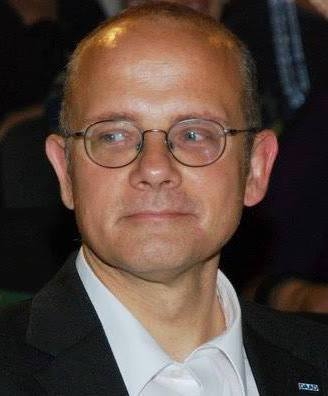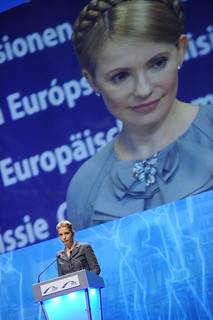EPP Congress Marseille 5844 by European People's Party - EPP
For two years now, Ukrainian opposition leader Yulia Tymoshenko has been in prison, and the European Union has constantly demanded her release. While the former prime minister's name is not mentioned in all of Brussels's statements, it is clear that her discharge is a necessary prerequisite for signing the Association Agreement. Why has the EU set such a condition for concluding this historic agreement, and what role does the Tymoshenko case play?
In Kyiv and some eastern EU capitals, there are many who would like see the agreement signed irrespective of whether Tymoshenko is free. Even some in the West regard Brussels's position as too strict. They argue that the agreement is also important for the EU and thus, needs to be signed, in any case. But such demands are unhelpful for three reasons.
First, whatever one may think about the geopolitics of Eastern Europe, some EU member countries will not agree to move forward with signing the agreement as long as Tymoshenko is in jail. All 28 member states must consent for the agreement to be concluded. So Ukraine's recent public relations campaigns and diplomatic initiatives in Brussels make little sense: The opinions even of the presidents of the European Council, Commission and Parliament are of secondary importance when it comes to the Association Agreement. Mobilizing the current Ukrainian government's few remaining supporters in eastern EU countries or hiring retired Western politicians for PR campaigns is equally useless. It will do little to alleviate the widespread skepticism towards Ukraine, especially in Western Europe.
The Tymoshenko case is one of the few topics that the Western public knows about Ukraine. To most Europeans, Ukraine is a white spot on Europe's map associated with "Dynamo Kyiv," "Chornobyl," and "Klitschko." Knowledge of Ukrainian politics rarely goes beyond the fact that the "beautiful woman with braids" is in jail. An additional problem for the Ukrainian government is that Tymoshenko's party Batkyvshchina has an official observer status with the European People's Party -- the all-European alliance of center-right parties that rule many EU countries today.
To those West European elites with some knowledge about Ukraine, the argument for Tymoshenko's imprisonment was ultimately discredited by the recent European Court of Human Rights ruling. It always seemed suspicious that, under President Viktor Yanukovych, Ukrainian opposition leaders like Tymoshenko and Yuri Lutsenko were prosecuted for alleged misconduct, but prominent ruling party members were not. Kyiv has, in response, argued the West should respect the fact that a Ukrainian court, after due trial, decided to put Tymoshenko in jail. But for most in the West the ECHR ruling once more confirmed that there had never been a proper legal trial, and Tymoshenko's sentence had not been passed by a court deserving that name.
Second, there is, in Kyiv and also some EU capitals, an argument that the EU should show flexibility with regard to Ukraine, which is not perfect but -- as a post-totalitarian country -- deserves leeway. This view ignores, however, the surprising concessions that the EU has already made with regard to Yanukovych's numerous violations of basic democratic principles. For example, the flagrant disregard for Ukrainian voters, shown by the formation of the first 2010 Azarov government with the help of mandate-changers (known as "tushki"), was never a sticking point for Brussels.
Also in 2010, Ukraine's Constitutional Court changed Ukraine's basic law, and gave the president much larger competences than Yanukovych had received when being elected several months earlier. Brussels neither made the procedure of amending Ukraine's Constitution an issue, nor did it demand new presidential elections. That the EU is today ready to negotiate with a president many powers of whom lack proper democratic legitimacy is an enormous compliment to Ukraine. By accepting these and other scandalous transgressions, the EU has already, to an unusual degree, watered down its basic principles. Against this background demands for more softening, e.g. that Tymoshenko may stay in jail, look bizarre.
A third, related argument has recently been voiced by Guenter Verheugen, a German former EU Commissioner. Verheugen noted that it is not membership, but merely association which is at stake, and Brussels should not use double standards toward Ukraine. However, this argument not only overlooks the numerous allowances already made, for Yanukovych. It also ignores the novel quality of the EU-Ukraine Association Agreement. This pact may share a name with earlier treaties between the EU and third countries. But the Ukrainian agreement goes much further, deeply integrating Ukraine's economy and politics into Europe's. Moreover, even the less ambitious earlier association agreements were not given out for free. It is true that the EEC's first Association Agreement of 1961 was concluded with an only partially democratic Greece. But this agreement was frozen by Brussels in 1967 after a military coup. When, in 1962, Madrid asked Brussels for an association agreement, it was firmly rejected by the European community, because of Franco's authoritarianism. When Romania's democratization process was souring in the early 1990s, Brussels even halted, for a while, the signing of a much smaller cooperation agreement with Bucharest.
The EU has already gone out of its way by initialing the largest agreement in its history with as dubious a polity as Ukraine is today. The only way for Kyiv to get the agreement signed is to free Tymoshenko. Yanukovych will also have to show "tangible progress" in fulfilling the other prerequisites, and make sure to not open up entirely new issues, for instance, by curtailing press freedom. Whoever thinks that it's possible to get around these conditions and away with further manipulations is simply daydreaming.
This article was first published, as an op-ed, in the Ukrainian newspaper Kyiv Post.






